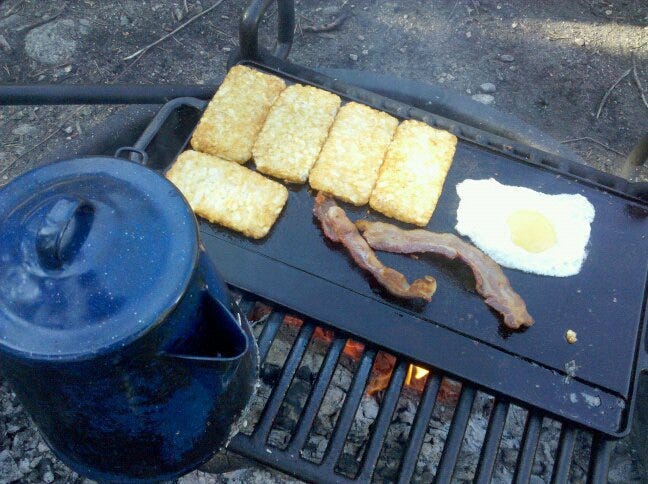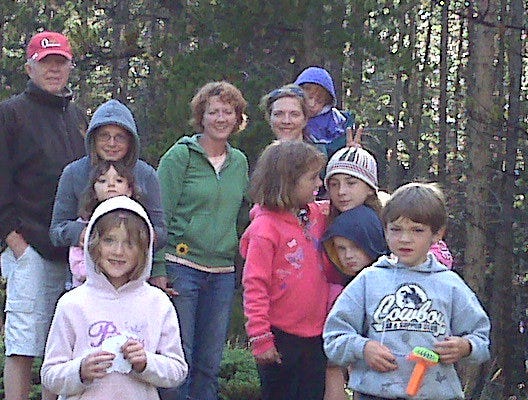Forest to Fork in the Bighorn Mountains
A culinary heaven provided by nature; appreciated by few.
Long before the words Farm to Fork existed side by side in a sentence, before the explosion of protein bars and Cup O’ Noodles and gourmet jerky; back before the French coffee press made its way from the cafes of Paris into the backpacks of American campers, and back when astronauts were the only people eating freeze-dried ice cream from foil bags, my brothers, sisters, cousins and I spent our summers in the mountains of Wyoming, sleeping in tents, floating down creeks, fishing in lakes, and eating local, sustainable, direct-to-consumer food.
My mother, aunts and grandmother were pioneers of the Forest to Fork movement. I like to think my siblings, cousins and I were the original foodies. Except that we weren’t. Because unlike true foodies, we had very little interest in and zero appreciation for most of the amazing food we were eating. We may have been on the forefront of Forest to Fork, but like most kids, we were more interested in our next great adventure, whether that was a marathon game of capture the flag or sneaking off to poach fish from the stocked pond at the rustic resort up the road. Food was not savored, appreciated or enjoyed for its source, locality or presentation. It was eaten, as quickly as possible, for the sole purpose of providing energy for whatever escapade was coming next.
The fact that there wasn’t a discerning palate among our young motley crew does not change the fact that what was being prepared was what I now recognize to be the very food that we cherish, obsess over and are willing to pay exorbitant prices for today. When I remember the meals that were served to us, it makes my heart hurt with regret at my lack of appreciation.
Rainbow trout, chokecherries, rosehips, wild asparagus, strawberries, onions and rhubarb are just some of the staples that made regular appearances on our plates. So many delicacies, caught, picked, plucked or foraged from the wilds of the Bighorn Mountains that served as our playground and home for so many summers of our childhood.
Every June, we would pack our dad’s Chevy work truck with coolers, sleeping bags, fishing poles, firewood, and socks and underwear for six kids. Sometimes there were supplies for a long weekend, other times enough for a couple of weeks.
When all the provisions were tied securely in the bed of the truck, we would jump on top of them and settle in for the windy two-hour ride up I-90 to our grandparents’ home in Sheridan and another hour through Ranchester and Dayton, then up Highway 14 to Burgess Junction.
We set up camp in the North Tongue River Campground on Little Willow Creek, very near where the Little Willow and the Big Willow meet the North Tongue River.
Nothing said “We’ve arrived” like getting a campfire going in the fire pit. This campfire would be the heart of our camp home, brewing the morning coffee, heating the water to wash our faces, providing warmth and ambiance for our nightly guitar singalongs and, most importantly, cooking the food that would sustain us during our stay.
There was no fancy camp stove or cooking equipment. In fact, the most advanced and essential piece of equipment was the square lid of an old Maytag washing machine that my grandpa had sandblasted to remove the paint. Seasoned with bacon grease, it was the perfect surface to set over the flames or coals to cook pancakes and fry cornmeal-crusted Rainbow trout with potatoes and wild onions. Equally indispensable was my grandma’s cast iron skillet that was used to “bake” rustic chokecherry and wild rhubarb cobbler in the after-dinner coals.
A simple soup pot or Dutch oven was the only dish needed to make our favorite childhood camping meal. Countless little hands helped in forming biscuit dough into balls and then wrapping them around small cubes of cheddar cheese. The cheese-filled biscuit dumplings were dropped into rich tomato soup and they simmered together to form what we knew as “Bags of Gold.” At an elevation of over 8,000 feet, it took a while to cook the dumplings, but it was always worth the wait. I remember how delicious that one-pot meal was and how I couldn’t wait to dig my spoon into the tender dumplings to expose the oozing, golden cheddar cheese in the middle.
Today, I camp with my kids and we have wonderful, memorable adventures. We roast hot dogs, toast marshmallows and sip hot cocoa. On our last trip, my son made perfect poached eggs on our camp stove.
But I miss the camping food from my childhood. I miss the people who prepared it. And the kids who ate it. They understood what it meant to go camping. To work with what they had. To be carefree, creative and adventurous. Nobody worried about burning the soup or over-seasoning the potatoes. Nobody worried that my brother wouldn’t show up with a slew of freshly caught, freshly cleaned trout strung across a long, green willow branch.
One time, when we returned from a hike with an abundance of wild rhubarb, my grandma made jam with nothing but some sugar, the rhubarb and a box of strawberry Jell-O. Another time, we dug a three-foot hole in the ground, lined it with coals from the fire, heaved in a 12-pound turkey that was wrapped in cheesecloth and foil, shoveled in more coals and then buried the whole lot. Seven hours later, we dug it up, brushed off the dirt, removed the foil and cheesecloth and had juicy carved turkey for dinner.
I miss those summer days and the food and the family and the fun we had. As Andy said in the last episode of The Office, “I wish there was a way to know you're in the good old days before you've actually left them.”
Me too, Andy.




Brings back many memories.